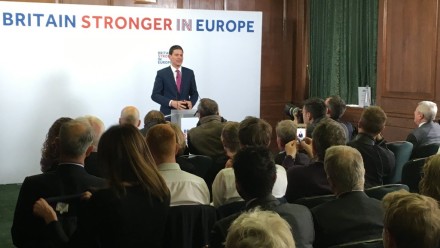
He came to talk about Britain’s place in Europe. They came to talk about David Miliband.
This is the drama which crackles away each time the former Foreign Secretary gives a speech in Britain. But Miliband wasn’t here to indulge the centrists – even though a few of them were in the room.
He was in Church House, Westminster, to make a wholehearted case for Britain remaining in the EU, where he was introduced by his former Cabinet colleague, a smiling Alan Johnson. Miliband brimmed with passion and, as he made an argument to Remain borne out of strength rather than fear, looked stronger in the process.
“Today I would like to focus not on the strength of Britain’s economy, or the strength of our borders, but our strength in the world, and the strength of the institutions that make the world more secure, more prosperous, more stable and more sustainable, not just for us but for the rest of humanity as well”, he said.
His speech was layered with the language of leadership – not necessarily of a political party, but of someone used to confronting cross-border crises, which he has done as chief executive of the International Rescue Committee.
Today Miliaand was speaking for himself, not the aid agency. He ranged across global problems. His oration went beyond an economic argument and spanned the democratic alliances across the EU and the threats posed by climate change, tax avoidance and terrorists, which he said would be worsened by a vote for Brexit.
But this was not Project Fear.
“Rather, it is quitting Europe which is Project Fantasy”, Miliband said.
“Unilateral political disarmament is not a joke or a jape. It is a recipe for instability not order, derision not applause, a fall not pride.
“The sceptics say that in Europe we lose sovereignty and national control. But that is like saying that when you decide to join a club, you give away power over the rules. No: you get the power to help decide the rules for a larger group.”
His pitch, like all political battles, came down to a them-and-us-type divide.
On one side stands much of the pro-EU British political establishment, lined up alongside Barack Obama and Angela Merkel, ranged against a gang Miliband might view as a dangerous ragbag: “[with] Boris Johnson it will be Marine Le Pen, Vladimir Putin and perhaps Donald Trump”.
Could Jeremy Corbyn have spoken with such force? Yes – but perhaps not on the EU.
Ever since he was elected, and swung behind Labour’s In campaign, the party leader has been seen as a reluctant champion of the case for the EU.
After months of waiting, however, Labour’s EU supporters will soon get their wish when Corbyn makes his case for remaining in the bloc in a keynote speech on Thursday.
Of course, Miliband wasn’t back in London to talk about Corbyn. He didn’t even mention the leader in his speech, although he did seem to make a coded criticism of him earlier on the Today programme when he highlighted the 50 per cent of Labour voters who are so far unaware of the party’s stance in the referendum. And, when taking questions this afternoon, he said rather pointedly that he was looking forward to seeing Labour’s “united position carried forward with vigour and enthusiasm” in the run-up to polling day on June 23.
But Miliband did have some more direct criticisms of David Cameron. He attacked the prime minister for “flirting” with the possibility of Brexit and made the point that Cameron had been in Downing Street for some six years before he decided to back Britain’s position inside the EU.
In all, Miliband didn’t sound like he was auditioning for anything today. And, this time, there were no warnings for Labour over its electoral prospects. He was simply making the wholehearted case for the European political project in which he believes.
It was wonkish at times, but also waspish. He praised Britain’s role as a “thought-leader in European humanitarian and development policy” but was also more direct, describing this country as a “firefighter” rather than “arsonist” because we are “not not an Empire, have learnt the costs of isolation, and know the importance of playing by the rules”.
There were no clues as to Miliband’s future plans. He hinted last month that he will not stay in his New York job “forever” but what lies beyond that is unknown to us, and perhaps to him.
“Distance lends perspective”, he said, in relation to Britain’s place in the world. But it could just as easily have been a brief reflection on his relationship with Westminster, or of his party’s attitude towards him. Amid unending speculation over his future intentions, the confidence and passion with which Miliband spoke showed that while he is no longer a Labour MP, he remains a Labour politician to his fingertips.




More from LabourList
Delivering in Government: your weekly round up of good news Labour stories
‘Forgotten fathers: pipefitters, plumbers and the paternity pay gap’
‘How can Britain build peace for Palestinians without owning its own past?’